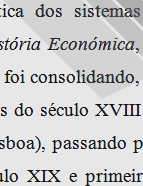

................................
However, his most renowned work is the aforementioned Portugal Económico, where he emerges as a fervent advocate of agrarianism, influencing other proponents of this policy (such as Pequito Rebelo) and Oliveira Salazar himself (José Amado Mendes, "Desenvolvimento..." [Development..."], 1996, pp. 198-199). The author addresses a variety of topics (land, property, agriculture, commerce, currency, and finance), informing readers in the initial "Explanation" that his work concerns contemporary history but his aim had been to write it as if it were ancient history, "without worrying about doctrinal debates, which so often hinder the accuracy of appraisals" (Anselmo de Andrade, Portugal Económico, p. VI). Despite stating this principle, he ultimately engaged in these debates, for example, by defending a theory he was unable to prove and one that is not true, namely that Portugal was not and could never become an industrial country due to its lack of raw materials and fuel (coal). He explicitly states what would later align closely with Salazar's thinking: "everyone knows what a crowd of unemployed, hungry workers on the street is like" (Idem, Idem, p. 341-343). A decade and a half after the first edition of the work (1902), the young José Henrique de Azeredo Perdigão (1896-1993), then still a law student at the University of Lisbon and future President of the Calouste Gulbenkian Foundation, refuted Anselmo de Andrade's agrarian theory point by point, advocating for the industrialisation of the country (1916), a stance later followed by Ezequiel de Campos, J. N. Ferreira Dias, and others. Despite its title—still tributary to nineteenth-century conceptions—Anselmo de Andrade's work was already about economic history. The author's perspective has also been noted to align closely with the German historical school, by "resorting to the concept of national economy as a fundamental unit" (Carlos Bastien, A divisão..., 2000, p. 17). These nineteenth-century conceptions are also present in the works of other authors from the same period, two of which are explicitly stated in their titles. Although often forgotten, Adriano Antero de Sousa Pinto (1846-1934) is worthy of mention. A law graduate from the University of Coimbra, he was a lawyer, an assemblyman on several occasions, vice-president of the Porto City Council, and a professor at the Industrial and Commercial Institute of Porto. He authored several works—on law, labour, the wine crisis, and divorce—and also published the História Económica [Economic History] (vols. I to VI, 1905-1925; despite completing the manuscript for vol. VII before his death, it remains unpublished). This was a universal history of commerce and industry, unique until then in the Iberian Peninsula.
